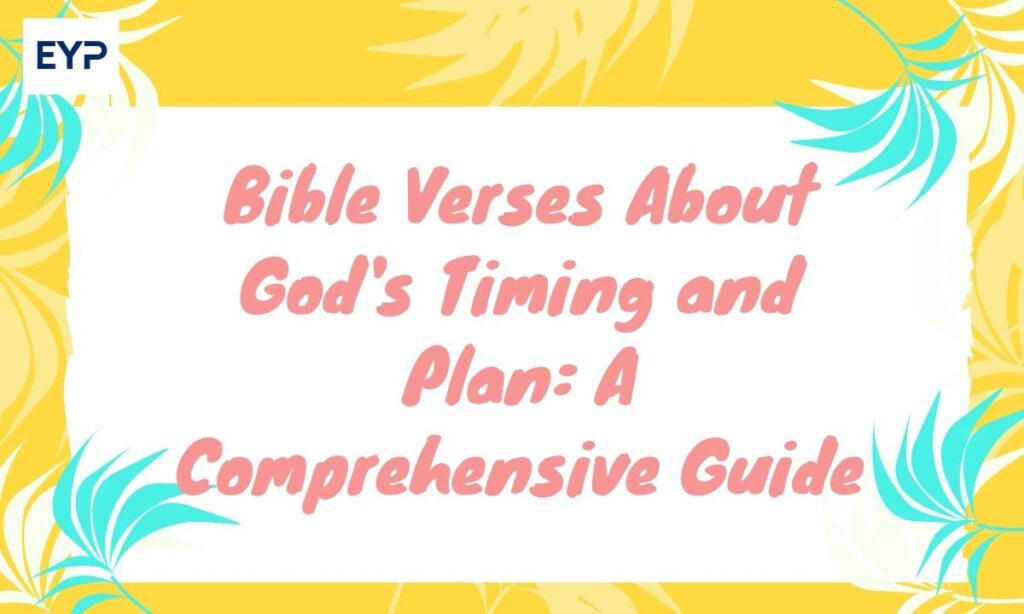One of life’s greatest challenges is understanding and accepting God’s timing while navigating our own plans and expectations. Throughout Scripture, we find countless verses that illuminate the divine perspective on timing, purpose, and sovereignty. This comprehensive guide explores 50 carefully selected Bible verses organized into five essential themes that reveal God’s perfect timing and His magnificent plan for our lives.
The concept of divine timing permeates every aspect of Christian faith. From the moment God created the world in six days and rested on the seventh, establishing rhythm and order, to the prophetic promises of Christ’s return, timing has always been central to God’s character and plan.
Trusting in God’s Timing
1. Ecclesiastes 3:1
“For everything there is a season, and a time for every matter under heaven.”
Solomon’s wisdom in Ecclesiastes reveals one of Scripture’s most fundamental truths about timing. This verse introduces the famous passage about seasons of life, acknowledging that God has ordained specific times for every human experience.
The Hebrew word for “season” (zeman) suggests an appointed time or proper moment, indicating that life’s events aren’t random but divinely orchestrated.This verse teaches us that our impatience often stems from fighting against God’s established seasons.
2. Psalm 27:14
“Wait for the Lord; be strong, and let your heart take courage; wait for the Lord!”
David’s double emphasis on waiting reveals the difficulty and importance of this spiritual discipline. The Hebrew word “qavah” means to wait with expectation, like a rope that stretches under tension but doesn’t break.
This isn’t passive waiting but active trust that requires strength and courage.The repetition in this verse emphasizes that waiting on God is often contrary to our natural instincts. We want immediate answers, quick solutions, and instant gratification.
3. Isaiah 40:31
“But they who wait for the Lord shall renew their strength; they shall mount up with wings like eagles; they shall run and not be weary; they shall walk and not faint.”
This beloved verse presents one of Scripture’s most beautiful pictures of what happens when we align ourselves with God’s timing.
The imagery of eagles is particularly significant because eagles use thermal currents to soar effortlessly, demonstrating how waiting on God allows us to accomplish more with divine assistance than we could through human effort alone.
4. 2 Peter 3:8
“But do not overlook this one fact, beloved, that with the Lord one day is as a thousand years, and a thousand years as one day.”
Peter addresses one of humanity’s greatest struggles with divine timing: the apparent delay of God’s promises. This verse reveals that God operates from an eternal perspective that transcends human time constraints.
The comparison between days and millennia isn’t meant to be taken literally but illustrates the fundamental difference between human and divine perspectives on time.This truth brings tremendous comfort when we’re waiting for prayers to be answered or promises to be fulfilled.
5. Habakkuk 2:3
“For still the vision awaits its appointed time; it hastens to the end—it will not lie. If it seems slow, wait for it; it will surely come; it will not delay.”
Habakkuk struggled with God’s apparent inaction in the face of injustice, making his prophecy particularly relevant for those wrestling with divine timing. God’s response emphasizes that His promises have “appointed times” – specific moments when they will be fulfilled.
The phrase “it hastens to the end” suggests that from God’s perspective, the fulfillment is rushing toward completion, even when it appears slow to us.This verse teaches us that our perception of God’s timing is often flawed.
6. Psalm 31:15
“My times are in your hands; rescue me from the hand of my enemies and from my persecutors!”
David’s declaration of trust places his entire timeline – past, present, and future – into God’s sovereign care. The phrase “my times” encompasses all aspects of timing in his life: the timing of challenges, deliverances, opportunities, and even death.
This represents complete surrender to God’s scheduling of life events.This verse teaches us that anxiety about timing often stems from trying to maintain control over circumstances beyond our influence.
7. Lamentations 3:25-26
“The Lord is good to those who wait for him, to the soul who seeks him. It is good that one should wait quietly for the salvation of the Lord.”
Written during one of Israel’s darkest periods, these verses emerge from deep suffering and yet affirm God’s goodness to those who wait.
The word “good” appears twice, emphasizing that both God’s character and the act of waiting are beneficial. This challenges our natural assumption that waiting is always negative or wasteful.
8. Micah 7:7
“But as for me, I will look to the Lord; I will wait for the God of my salvation; my God will hear me.”
Micah’s personal declaration of faith comes in the midst of describing societal corruption and moral decay. Despite external circumstances, he chooses to look to the Lord and wait for salvation.
This verse demonstrates that trusting God’s timing is often a deliberate choice that goes against circumstances and emotions.The progression from looking to waiting to confident expectation shows the development of faith-based patience.
9. James 5:7
“Be patient, therefore, brothers, until the coming of the Lord. See how the farmer waits for the precious fruit of the earth, being patient about it, until it receives the early and the late rains.”
James uses agricultural imagery to teach about patience with God’s timing. Farmers understand that rushing the growing process destroys crops, so they wait for natural seasons and weather patterns.
This metaphor applies perfectly to spiritual growth and God’s answers to prayer – forcing outcomes prematurely often prevents the full blessing God intends.
10. Romans 8:25
“But if we hope for what we do not see, we wait for it with patience.”
Paul connects hope, faith, and patience as essential elements of Christian living. The “what we do not see” refers not only to future resurrection and glorification but also to present promises that haven’t yet materialized.
This verse acknowledges that Christian life involves hoping for and waiting for things that aren’t yet visible or tangible.The patience described here isn’t mere resignation but confident expectation based on God’s proven faithfulness.
Understanding God’s Plan
1. Jeremiah 29:11
“For I know the plans I have for you, declares the Lord, plans for welfare and not for evil, to give you a future and a hope.”
Perhaps one of the most quoted verses about God’s plan, this promise was originally given to Jewish exiles in Babylon facing 70 years of captivity.
The context makes the promise even more powerful – God assured His people of His good intentions even during their darkest period. The Hebrew word for “plans” (machashavah) implies thoughtful, deliberate intentions, not casual wishes.
2. Proverbs 19:21
“Many are the plans in the mind of a man, but it is the purpose of the Lord that will stand.”
This proverb acknowledges human planning while affirming divine sovereignty over outcomes. It doesn’t discourage us from making plans but reminds us that our plans must ultimately align with God’s purposes to succeed.
The contrast between “many plans” and “the purpose” suggests that while we often have multiple competing ideas, God has one unified purpose that will prevail.Understanding this verse helps us hold our plans lightly while pursuing them diligently.
3. Romans 8:28
“And we know that for those who love God all things work together for good, for those who are called according to his purpose.”
This verse provides one of Scripture’s strongest assurances about God’s plan, yet it’s often misunderstood. Paul doesn’t say that all things are good in themselves, but that God works all things together for good for those who love Him.
The Greek word “synergeo” (work together) suggests divine orchestration that weaves even negative experiences into positive outcomes.
4. Isaiah 55:8-9
“For my thoughts are not your thoughts, neither are your ways my ways, declares the Lord. For as the heavens are higher than the earth, so are my ways higher than your ways and my thoughts than your thoughts.”
These verses humble human understanding while exalting divine wisdom. The comparison between heaven and earth emphasizes the infinite gap between human and divine perspective.
This isn’t meant to discourage us from thinking or planning but to remind us of our limitations and God’s superiority in wisdom and understanding.
5. Proverbs 16:9
“The heart of man plans his way, but the Lord establishes his steps.”
This verse perfectly balances human responsibility with divine sovereignty. It acknowledges that planning is a natural and appropriate human activity while affirming that God ultimately directs our path.
The word “establishes” suggests that God not only allows but actively guides our steps, even when we think we’re following our own plans.
6. Ephesians 2:10
“For we are his workmanship, created in Christ Jesus for good works, which God prepared beforehand, that we should walk in them.”
Paul reveals that God’s plan for our lives includes specific good works that He prepared in advance for us to accomplish. The word “workmanship” (poiema in Greek) refers to a work of art or masterpiece, suggesting that our lives are carefully crafted by God for specific purposes.
This gives tremendous meaning and dignity to every believer’s life.The phrase “prepared beforehand” indicates that God’s planning for our lives predates our existence.
7. Psalm 33:11
“The counsel of the Lord stands forever, the plans of his heart to all generations.”
This verse emphasizes the eternal, unchanging nature of God’s plans. Unlike human plans that can be frustrated by circumstances or changed by new information, God’s plans remain constant across all generations.
The word “counsel” suggests deliberate decision-making based on perfect wisdom and complete knowledge.
8. Proverbs 3:5-6
“Trust in the Lord with all your heart, and do not lean on your own understanding. In all your ways acknowledge him, and he will make straight paths.”
These beloved verses provide practical guidance for aligning with God’s plan. Complete trust (“with all your heart”) is contrasted with relying on limited human understanding.
The promise of straight paths doesn’t mean easy paths but clear, purposeful direction that leads to God’s intended destination.
9. Psalm 40:5
“You have multiplied, O Lord my God, your wondrous deeds and your thoughts toward us; none can compare with you! I will proclaim and tell them, yet they are more than can be told.”
David marvels at the abundance and complexity of God’s plans and actions toward His people. The phrase “thoughts toward us” reveals that God constantly thinks about and plans for our welfare.
The countless nature of these thoughts and deeds suggests that God’s planning for our lives is incredibly detailed and comprehensive.
10. Job 42:2
“I know that you can do all things, and that no purpose of yours can be thwarted.”
Job’s declaration comes after experiencing tremendous suffering and confusion about God’s ways. Through his trials, he learned that God’s purposes cannot be defeated or derailed by any opposition, whether human, demonic, or circumstantial.
This represents one of Scripture’s strongest affirmations of God’s sovereign control over His plans.
Patience and Perseverance
1. Galatians 6:9
“And let us not grow weary of doing good, for in due season we will reap, if we do not give up.”
Paul addresses the universal temptation to quit when results don’t come quickly. The phrase “doing good” encompasses all forms of faithful service and obedience to God.
The promise of reaping “in due season” connects our perseverance to God’s perfect timing, assuring us that faithfulness will eventually produce results.
2. Hebrews 10:36
“For you have a need of endurance, so that when you have done the will of God, you may receive what is promised.”
The writer of Hebrews connects endurance directly to receiving God’s promises. This verse suggests that doing God’s will is often just the beginning; endurance through subsequent trials and waiting periods is equally important for receiving the full blessing God intends.
This teaching challenges the modern expectation of immediate results. Spiritual maturity recognizes that the gap between obedience and reward often involves a testing period where our faith and commitment are refined. Endurance during this period demonstrates the genuineness of our faith and prepares us to properly handle God’s blessings.
3. 2 Timothy 4:7
“I have fought the good fight, I have finished the race, I have kept the faith.”
Paul’s final declaration uses three metaphors – fighting, racing, and faith-keeping – to describe a life of perseverance. Each metaphor emphasizes different aspects of spiritual endurance: fighting suggests active resistance against opposition, racing implies sustained effort toward a goal, and keeping faith involves maintaining trust despite difficulties.
This verse teaches us that perseverance isn’t passive but requires active engagement with life’s challenges. It also shows that perseverance has a completion point; we’re not called to endless struggle but to faithful endurance until God’s purposes are accomplished in our lives.
4. James 1:4
“And let steadfastness have its full effect, that you may be perfect and complete, lacking in nothing.”
James reveals that steadfastness through trials serves a divine purpose: spiritual maturity and completeness. The word “perfect” (teleios in Greek) means mature or complete rather than sinless. This verse teaches us that difficulties aren’t obstacles to God’s plan but instruments He uses to accomplish His purposes in our character.
The promise of lacking nothing doesn’t refer to material possessions but to spiritual qualities necessary for effective Christian living. When we allow steadfastness to complete its work, we develop the character traits necessary to fulfill God’s purposes for our lives.
5. Romans 5:3-4
“Not only that, but we rejoice in our sufferings, knowing that suffering produces endurance, and endurance produces character, and character produces hope.”
Paul outlines the spiritual progression that transforms suffering into hope through God’s design. This passage doesn’t encourage us to seek suffering but to recognize its potential for spiritual development when properly endured. Each stage in the progression builds upon the previous one, creating a foundation for unshakeable hope.
The word “rejoice” doesn’t mean we enjoy pain but that we can find joy in suffering’s ultimate purpose and outcome. This perspective transforms our relationship with difficulties from victimization to participation in God’s character-building process.
6. 1 Corinthians 9:24
“Do you not know that in a race all the runners run, but only one receives the prize? So run that you may obtain it.”
Paul uses athletic imagery to illustrate the focused effort required for spiritual success. The comparison to racing emphasizes that Christian living requires intentional, sustained effort rather than casual participation. The prize isn’t salvation, which is a gift, but the rewards of faithful service and spiritual maturity.
This verse teaches us that perseverance must be purposeful and directed. Just as athletes train with specific goals and methods, our spiritual perseverance should be focused on specific objectives aligned with God’s purposes for our lives.
7. Romans 12:12
“Rejoice in hope, be patient in tribulation, be constant in prayer.”
Paul provides three practical attitudes for maintaining perseverance: joy in hope, patience in trouble, and consistency in prayer. These attitudes work together to sustain us through difficult seasons while keeping us connected to God’s purposes and power.
The command to “rejoice in hope” reminds us that our current circumstances don’t determine our ultimate destiny. Patience in tribulation acknowledges that difficulties are temporary, while constant prayer maintains our connection to divine strength and guidance throughout the journey.
8. 1 Peter 5:10
“And after you have suffered a little while, the God of all grace, who has called you to his eternal glory in Christ, will himself restore, confirm, strengthen, and establish you.”
Peter promises that suffering has both limitations (“a little while”) and purpose (restoration, confirmation, strengthening, and establishment). The phrase “God of all grace” emphasizes that He doesn’t abandon us during difficulties but works through them to accomplish His purposes in our lives.
The four-fold promise of restoration, confirmation, strengthening, and establishment shows that God doesn’t just end our suffering but uses it to improve our spiritual condition. This transforms our perspective on difficult seasons from endurance contests to developmental opportunities.
9. Revelation 14:12
“Here is a call for the endurance of the saints, those who keep the commandments of God and their faith in Jesus.”
This verse from Revelation connects endurance specifically to maintaining obedience to God’s commands and faith in Jesus during challenging times. The context suggests that endurance becomes particularly important during periods of spiritual opposition and social pressure.
The dual focus on commandments and faith emphasizes that true endurance involves both external obedience and internal trust. Neither legalistic rule-keeping nor faith without works constitutes biblical endurance; both elements must remain strong for faithful perseverance.
10. Psalm 40:1
“I waited patiently for the Lord; he inclined to me and heard my cry.”
David’s testimony connects patient waiting with God’s responsive action. The phrase “inclined to me” suggests that God bent down to listen, emphasizing His personal attention and care during our waiting periods. This verse assures us that patient waiting gets God’s attention and response.
This verse teaches us that patience in waiting isn’t passive resignation but active faith that expects God’s intervention. David’s patient waiting was rewarded with God’s attention and eventual deliverance, providing a model for our own seasons of waiting and prayer.
Divine Sovereignty and Control

1. Proverbs 21:1
“The king’s heart is a stream of water in the hand of the Lord; he turns it wherever he will.”
This proverb uses the metaphor of irrigation channels to describe God’s influence over human leaders. Just as farmers direct water flow through channels, God directs the decisions of those in authority according to His purposes. This doesn’t eliminate human responsibility but demonstrates God’s ultimate control over outcomes.
This verse provides tremendous comfort when political or organizational leaders make decisions that seem harmful or contrary to God’s purposes. It assures us that even the most powerful human authorities operate within the boundaries of God’s sovereign plan and cannot ultimately thwart His purposes.
2. Job 12:10
“In his hand is the life of every living thing and the breath of all mankind.”
Job acknowledges God’s fundamental control over life itself. This verse encompasses not just the initial gift of life but God’s ongoing sustaining power that maintains existence moment by moment. The phrase “in his hand” suggests both possession and protection, indicating that our lives are both owned and cared for by God.
Understanding this level of divine control provides security in uncertain times. If God controls life and breath, then He certainly oversees the details of daily existence. This doesn’t make us passive but encourages us to align our plans and efforts with the One who ultimately controls outcomes.
3. Proverbs 16:4
“The Lord has made everything for its purpose, even the wicked for the day of trouble.”
This verse presents one of Scripture’s most comprehensive statements about divine purpose, asserting that everything exists to serve God’s ultimate plan. Even those who oppose God serve His purposes, though not intentionally. This doesn’t make God the author of evil but shows His ability to use even rebellion to accomplish His righteous purposes.
This truth helps us understand that nothing happens outside God’s awareness or beyond His ability to incorporate into His plan. When we face opposition or injustice, we can trust that God will ultimately use these experiences to serve His good purposes in our lives and in history.
4. Daniel 4:35
“All the inhabitants of the earth are accounted as nothing, and he does according to his will among the host of heaven and among the inhabitants of the earth; and none can stay his hand or say to him, ‘What have you done?'”
Nebuchadnezzar’s declaration emphasizes God’s unlimited authority over both earthly and heavenly realms. The phrase “accounted as nothing” doesn’t diminish human value but emphasizes God’s supreme authority over all creation. No created being can successfully oppose or question God’s sovereign decisions.
5. Psalm 115:3
“Our God is in the heavens; he does all that he pleases.”
This psalm contrasts the living God with lifeless idols, emphasizing that God acts with complete freedom and authority. The phrase “does all that he pleases” doesn’t suggest arbitrary or selfish action but reflects God’s ability to accomplish His perfect will without hindrance or compromise.
Understanding God’s freedom to act according to His pleasure provides confidence in His plans for our lives. Since God’s pleasure is always consistent with His perfect character, we can trust that what pleases Him will ultimately be best for us, even when it doesn’t align with our immediate preferences.
6. Isaiah 46:10
“Declaring the end from the beginning and from ancient times things not yet done, saying, ‘My counsel shall stand, and I will accomplish all my purpose.'”
This verse highlights God’s unique ability to know and declare future events with absolute certainty. His counsel stands because He has both the knowledge to plan perfectly and the power to execute His plans without failure. The phrase “I will accomplish all my purpose” emphasizes God’s commitment to completing what He begins.
7. Genesis 50:20
“As for you, you meant evil against me, but God meant it for good, to bring it about that many people should be kept alive, as they are today.”
Joseph’s words to his brothers demonstrate how God’s sovereignty transforms evil intentions into good outcomes. This verse doesn’t excuse the brothers’ sinful actions but shows God’s ability to work through human decisions – both good and evil – to accomplish His purposes.
8. Proverbs 16:33
“The lot is cast into the lap, but its every decision is from the Lord.”
This proverb addresses what appears to be random chance, asserting that even seemingly arbitrary events fall under God’s control. In ancient times, casting lots was used to make decisions, similar to flipping a coin today. This verse teaches that nothing is truly random from God’s perspective.
9. Colossians 1:16-17
“For by him all things were created, in heaven and on earth, visible and invisible, whether thrones or dominions or rulers or authorities— all things were created through him and for him. And he is before all things, and in him all things hold together.”
Paul presents Christ as both Creator and Sustainer of all existence, including spiritual authorities and earthly powers. The phrase “hold together” (Greek: synistemi) suggests that Christ actively maintains the universe’s coherence and stability. This reveals the comprehensive nature of divine control over creation.
10. Romans 9:19-21
“You will say to me then, ‘Why does he still find fault? For who can resist his will?’ But who are you, O man, to answer back to God? Will what is molded say to its molder, ‘Why have you made me like this?’ Does the potter have no right over the clay, to make out of the same lump one vessel for honorable use and another for dishonorable use?”
Paul addresses human objections to divine sovereignty using the potter-clay metaphor. This passage doesn’t eliminate human responsibility but establishes God’s ultimate authority over His creation. The rhetorical questions emphasize the inappropriateness of creatures questioning their Creator’s decisions.
Hope and Assurance in God’s Plan
1. Romans 15:13
“May the God of hope fill you with all joy and peace in believing, so that by the power of the Holy Spirit you may abound in hope.”
Paul’s prayer identifies God as the source of hope and connects this hope to joy and peace through faith.
The phrase “abound in hope” suggests overflowing, abundant confidence in God’s promises and character. This hope comes through the Holy Spirit’s power rather than human effort or positive thinking.
2. Psalm 139:16
“Your eyes saw my unformed substance; in your book were written, every one of them, the days that were formed for me, when as yet there was none of them.”
David marvels at God’s intimate knowledge of his life before birth. The image of God’s “book” containing our days suggests detailed divine planning for each individual life. This verse assures us that our existence isn’t accidental but represents God’s intentional purpose and design.
3. Jeremiah 1:5
“Before I formed you in the womb I knew you, and before you were born I consecrated you; I appointed you a prophet to the nations.”
God’s call to Jeremiah reveals the extent of divine planning for individual lives. The progression from knowing to consecrating to appointing shows that God’s purposes for us involve intimate knowledge, holy preparation, and specific assignment. While not everyone is called to be a prophet, the principle of divine purpose applies to every believer.
4. 1 Corinthians 2:9
“But, as it is written, ‘What no eye has seen, nor ear heard, nor the heart of man imagined, what God has prepared for those who love him’—”
Paul quotes Isaiah to emphasize the extraordinary nature of God’s preparations for His people. This verse doesn’t refer only to heaven but includes all of God’s provisions for those who love Him. The threefold description – unseen, unheard, unimagined – emphasizes that God’s plans exceed human capacity to anticipate or understand.
5. 2 Corinthians 1:20
“For all the promises of God find their Yes in him. That is why it is through him that we utter our Amen to God for his glory.”
Paul affirms that Jesus Christ is the fulfillment and guarantee of all God’s promises. Every promise God has made finds its confirmation and completion in Christ. This verse provides the foundation for confident hope in God’s plan – if God kept His ultimate promise by sending Christ, we can trust Him to keep all other promises.
6. Psalm 33:18
“Behold, the eye of the Lord is on those who fear him, on those who hope in his steadfast love.”
This verse connects God’s watchful care with reverent fear and hopeful trust in His love. The phrase “eye of the Lord” suggests constant, personal attention rather than distant observation.
God doesn’t just know about our circumstances; He actively watches over those who maintain proper reverence for Him and hope in His faithful love.
7. Romans 8:31
“What then shall we say to these things? If God is for us, who can be against us?”
Paul’s rhetorical question follows his discussion of God’s predestining love and calling. The phrase “God is for us” doesn’t mean God automatically approves everything we do, but that He is committed to our ultimate good and His purposes for our lives. This divine commitment makes all opposition ultimately ineffective.
8. Psalm 138:8
“The Lord will fulfill his purpose for me; your steadfast love, O Lord, endures forever. Do not forsake the work of your hands.”
David expresses confidence that God will complete His purposes despite current difficulties. The connection between God’s purpose and His steadfast love suggests that divine purposes flow from divine love rather than arbitrary decisions.
The plea “do not forsake the work of your hands” acknowledges that we are God’s creation and responsibility.
9. John 14:27
“Peace I leave with you; my peace I give to you. Not as the world gives do I give to you. Let not your hearts be troubled, neither let them be afraid.”
Jesus promises a unique type of peace that differs fundamentally from worldly peace. Worldly peace depends on favorable circumstances, but Christ’s peace transcends circumstances and provides inner stability regardless of external conditions. This peace comes as a gift from Christ rather than an achievement through human effort.
10. Revelation 21:4
“‘He will wipe away every tear from their eyes, and death shall be no more, neither shall there be mourning, nor crying, nor pain anymore, for the former things have passed away.'”
This final promise from Revelation provides the ultimate assurance about God’s plan – the complete eradication of suffering and the restoration of perfect conditions. The personal image of God wiping away tears emphasizes His tender care and complete healing of all pain and loss.
Conclusion
The journey of faith involves learning to see our individual stories as part of God’s larger narrative, trusting that every chapter serves His purposes, and finding peace in His perfect timing.
As we meditate on these verses and apply their truths to our daily lives, we discover that God’s timing is indeed perfect, His plans are truly good, and His faithfulness endures forever. When anxiety about the future threatens our peace, these scriptures remind us that our times are in God’s hands, and He who began a good work in us will complete it.






